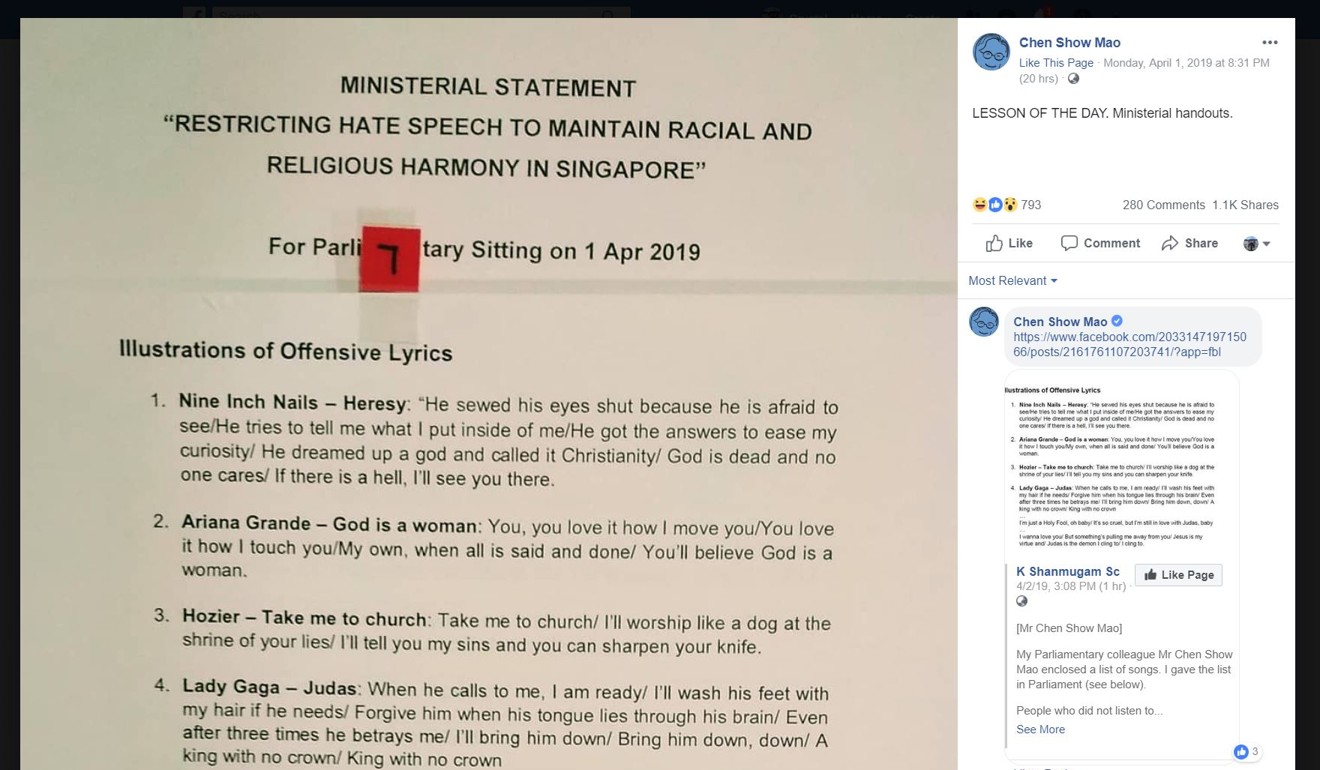
Derision on social media as Singapore’s list of ‘offensive’ songs by Lady Gaga, Ariana Grande hits the wrong notes
- A list of “offensive” lyrics by performers such as Lady Gaga, Ariana Grande and Nine Inch Nails was distributed to Singapore parliamentarians on Monday
- It was used cited as examples of songs that could affect racial and religious harmony in the city state
Chen Show Mao, from the opposition Workers’ Party, posted a picture of the supposedly offensive song list – which included lyrics by popular US singers such as Lady Gaga, Ariana Grande and Nine Inch Nails – on Facebook after Law Minister K Shanmugam spoke about the need for the city state to regulate hate speech to preserve racial harmony.

After the Facebook post generated debate, the minister on Tuesday clarified his views, saying that none of the songs listed would be banned.
“People who did not listen to the speech may misunderstand that the list contains songs which have been banned (!) or are going to be banned (!),” he wrote on Facebook.
Singapore introduces anti-fake news law to combat misinformation
“All of that is untrue. I made the point that people may find many things offensive. And gave the list as an illustration. Doesn’t mean that it can all get banned, just because some people find it offensive. That is also a point I made in the speech,” Shanmugam said.
In his earlier address on Monday, Shanmugam said music could be used to disrespect marginalised groups of people.
“Hate music has been used to label, devalue, persecute, and scapegoat particular groups of people, often minorities,” he said, pointing to the example of US white nationalists using music to dehumanise African-Americans.
He also elaborated on the notion of “offensive speech”, saying speech lacking in morals, intelligence and dignity needed to be regulated as it could lead to violence.
“The environment will be conducive for discrimination, eventually violence. This is why we have restrictions on offensive speech,” Shanmugam said. “How can we be one united people when it is accepted every day that one race or another, or one religion or another can be publicly insulted, ridiculed, attacked?”
Other social media users, including Siva Ram, ridiculed such views.
“I am a Hindu. I worship goddesses and sing devotional songs about them too. I also believe God is a woman as well. Does this mean I am into hate speech and those lyrics praising goddesses is offensive?” wrote Ram on Facebook, alluding to the lyrics of Ariana Grande’s song God is A Woman. “Does the same apply to my forefathers who have doing this since 5000 BC?”
Tiffany Chuang, a Singaporean sociology PhD candidate at the University of Michigan, said by making pop culture a matter of legal interest, the Singapore government could expand its opportunities to intervene in the public’s lives.
But the number of people who would be offended by the religious imagery in songs such as Lady Gaga’s Judas or Hozier’s Take Me to Church was small, Chuang said.
Metal band Watain hits back after Singapore bans its concert over fears its ‘Satanist views’ would disrupt social harmony
“These songs might upset a few strict Christian parents, but by no stretch of the imagination do they incite violence against Christians, or even denigrate them as a group,” she said. “We must remember that there is a long tradition of Western pop culture being critical of Christianity, which in the Western context is a form of resistance against a dominant cultural force.
“Christians are also over-represented in the upper echelons of Singaporean society, and are by no means marginalised victims requiring state protection.”
The government had earlier allowed the band to hold its concert with conditions that they did not perform songs with lyrics offensive to Christians, among other requirements, but the mainstream Christian view was that this was still not acceptable.
“The initial assessment was that, if the band did not perform offensively in Singapore, it should be acceptable,” he said. “However, two days before the concert, Ministry of Home Affairs received reports of mainstream Christians being very concerned and offended,” said the minister, adding he and his colleagues decided to cancel the show.
Chuang said although the state was largely reactive in its decision to intervene, such decisions did not represent the interests of the majority. “Unfortunately, it might be too easily triggered by vocal minorities who may not represent the majority of Singaporeans.”
Performers cited in the list of offensive lyrics, including Lady Gaga and Ariana Grande, have performed in the city state without controversy in the past. There has been no suggestion they would be banned from touring Singapore again.

